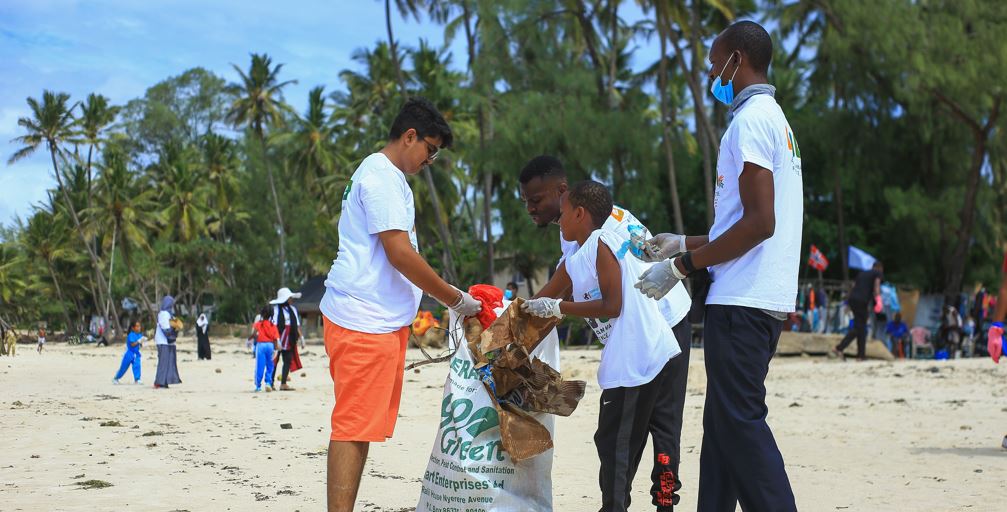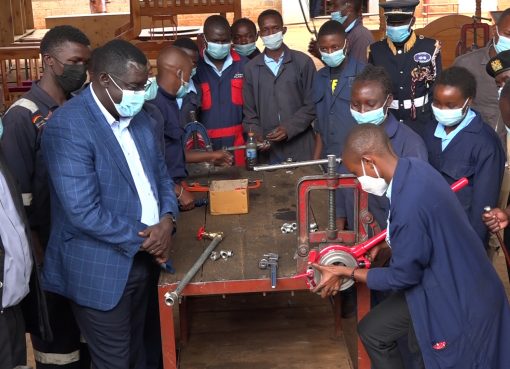Kenya Marine Fisheries and Research Institute (KMFRI) researchers have asked county governments that border the coastline to heighten the war against ocean pollution to protect marine ecosystems.
Speaking in Mombasa during the World Ocean Day commemoration at the Jomo Kenyatta Public Beach, KMFRI Director of Oceans and Coastal Systems and Blue Economy, James Mwaluma, said the dumping of plastics into the sea is still a deadly threat to marine life.
“Plastic pollution is the biggest concern; an estimated 37,000 tons of the same are dumped into the ocean every year due to human behaviors, and when it rains, many are also swept away during runoffs, ending up in the ocean, which ends up killing sea turtles,” said Mwaluma.
On June 5, 2019, Kenya banned single-use plastics on beaches, national parks, forests, and conservation areas.
The ban prohibits netizens from carrying single-use plastic water bottles, disposable cups, plates, cutlery, and straws into national parks, forests, beaches, and conservation areas.
The government agency official has raised concerns with continued sewerage waste discharge into the sea as well as the encroachment of the sea by developers, describing it as another threat to marine life and ecosystems.
The official said the devolved units should put up stringent laws and policies that prohibit untreated sewage waste discharge into the ocean.
KMFRI also wants a ban on plastics to be fully enforced by the respective agencies.
“We want them to do monitoring and enforcement, to ensure there is no direct sewage into the sea as well as regulate unplanned construction that encroach on the ocean. We also want the counties to heighten enforcement of plastics use, especially into the oceans,” Mwaluma said.
KMFRI has embarked on plastic recycling projects through the “TAKA’ Connect Application, that monitors the amount of plastic dumped in the sea.
Mwaluma said the amount of fish in the sea is affected by climate change.
“Plastics that end up in the sea affect small animals like pantones, which are affected by microplastics and end up in the food chain,” he added.
He also said that the plantation of artificial coral reefs and the restoration of mangroves are among the interventions targeted to mitigate climate change.
Kenya Fisheries Service Coastal Director Mwaka Barabara said the oceans and seas have huge potential in creating more job opportunities for fishermen through fishing and other ocean-related activities.
Barabara also called for a war on illegal and unregulated fishing, which has affected the income of a majority of coastal fishermen.
“We have interventions through laws to regulate that, but there is a lot of work to do to ensure our ecosystems and fishing areas are protected by the government and relevant agencies, “said Barabara.
The employment potential, as listed by Mercy Mghanga, the Indian Ocean Water Body Network Chairlady, is significantly improving the lives of Beach Management Units (BMU) across the coastal region.
Wasai, who also doubles as the Mombasa Beach Management Unit (BMU) Chair, said about 25,000 fishermen in the 101 registered BMUs at the coastal region are dependent on ocean resources to earn a living.
“We are asking for more laws that protect the oceans, especially in Kenya. “The oceans pose a huge economic potential for both local communities as well as earning the government significant revenue,” said Mghanga.
Kenya’s blue economy is estimated at Sh200 billion in annual revenue generation and directly impacts hundreds of Kenyans.
By Fatuma Said




